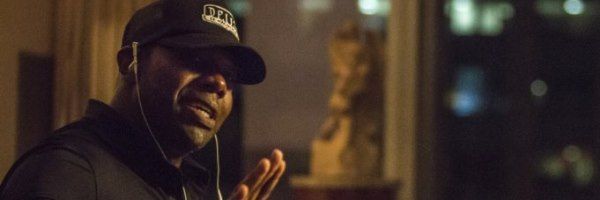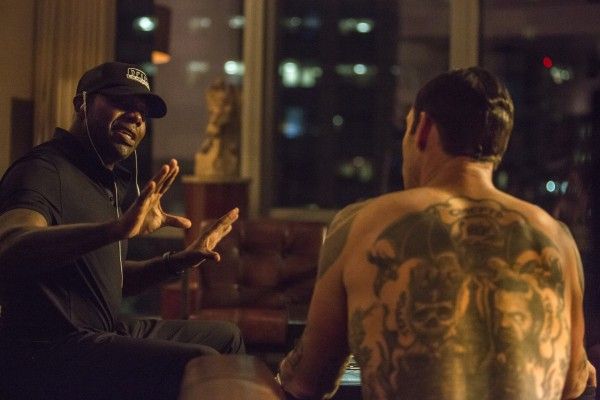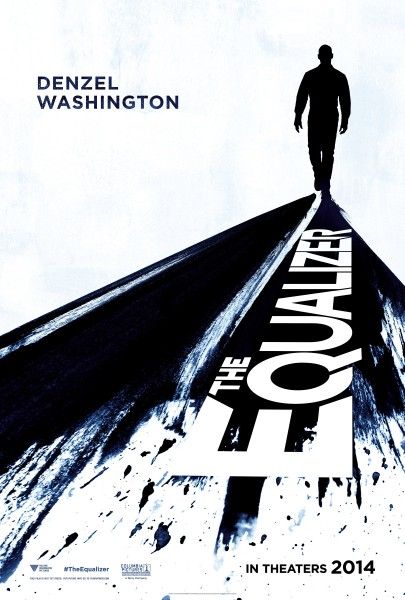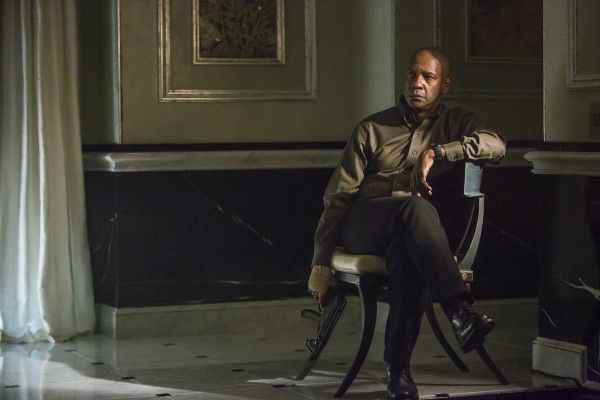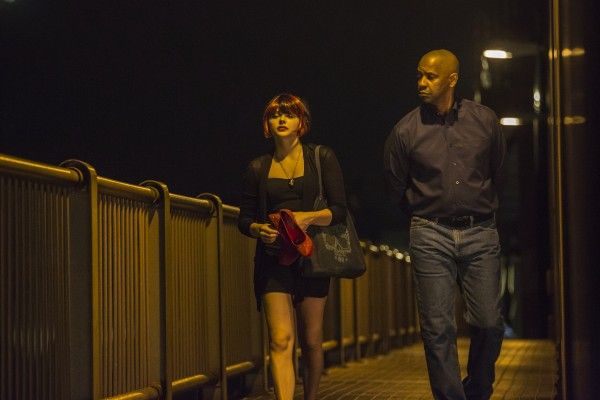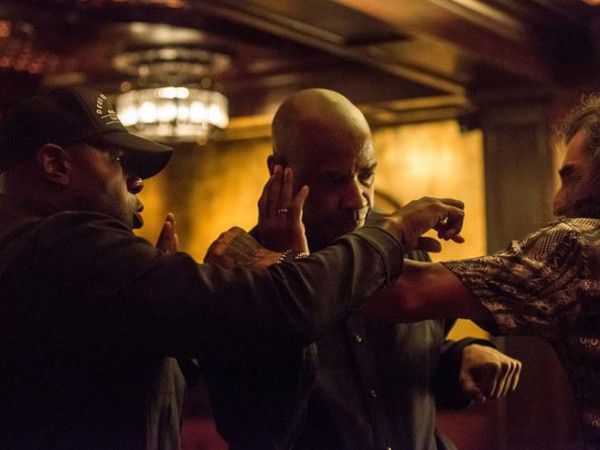Last August, when director Antoine Fuqua was filming The Equalizer outside of Boston, I got to visit the set along with a few other reporters. Adapted from the 1980s TV series of the same name, the pic reteams Denzel Washington with his Training Day director as he plays a former black ops commando who comes out of his self-imposed retirement to rescue a young girl (Chloe Grace Moretz). Soon thereafter, things go south and he finds himself squaring off against violent Russian gangsters. The film also stars Melissa Leo, Martin Csokas, Haley Bennett, David Harbour, and Bill Pullman. I learned a lot about the movie on the set visit and walked away thinking the film could turn out great, especially with Washington playing an ass-kicking hero defending folks that need help. When Sony test screened the movie, the pic scored huge numbers and they’re already prepping a sequel, which doesn’t surprise me at all.
During a group interview with Antoine Fuqua he talked about the changes from the 80s series, the hard R-rating, how it's "a bit of a throwback to the 70’s where characters are allowed to breathe a little bit more," how Washington plays a character with obsessive-compulsive disorder and the way it's used in the film, if he views Equalizer with franchise potential, the challenges of working with someone he's close to, and a lot more. Hit the jump for what he had to say. The Equalizer opens in traditional theaters and IMAX on September 26th.
Question: This is going to be sort of a fun question, I hope. You made Olympus Has Fallen and your movie kicked a little ass when compared to the other version made by Roland. Was there anything like Sony saying you couldn’t hire him?
ANTOINE FUQUA: Oh (laughter), I thought so, not really, not really. I mean, no. I was more nervous I think because when I signed on with Amy and everything, I thought, but my film wasn’t out yet. No, theirs wasn’t out yet, mine had come out and it was right after my interview with you. They had a meeting and Adele called about doing this film, so, it was fine. I didn’t know what would have happened if that film would have came out first. (laughter) So, no, it’s just business. It’s just business.
Can you give us your view of this film? We got the understanding there was a lot of character, a lot of dialogue, but then some really serious action.
FUQUA: Oh yeah, intense action. It’s a film-well, it’s a good question. When Jason and Todd and those guys asked me my take on it, my feeling was that it was more of a European style film, a bit of a throwback to the 70’s where characters are allowed to breathe a little bit more, and it takes its time and the heroes can be a little more interesting, unexpected and I saw it as a struggle. Even the Westerns that I grew up with, the Sergio Leone’s and all that, there was always a sort of anti-hero, a guy reluctant to shame even, to pick up the gun again because he wants to help other people, and he does, he uses his skills for that. I saw it as that kind of film because I’m a contemporary filmmaker trying to find my own take on the movie. Nowadays there are more European films I find interesting. So I’m going to take that approach with this film, but a little bit of a throwback.
So your description makes Olympus Has Fallen sound like it’s an urban Western.
FUQUA: You could call it that, I guess, you could certainly call it that. A lot of these types of films are, really, if you get down to the core most suspense thrillers in this genre, the Western is sort of the birth of it all.
Yeah, we have this outsider hero who stands up for society even though he’s not really a part of it.
FUQUA: One hundred percent, I mean, many of the Sergio Leone movies were with Clint Eastwood, and that’s what it is. He’s the hero riding into town, he’s the gunslinger, shame - the same thing, he didn’t want to do it anymore, he wanted to live a different life but part of who you are sort of haunts you and you can’t run away from evil and if you have special skills, and most people are mistreated, which is unfortunately in our world, we always need an equalizer, that type of character to come to our rescue. In movies you get to do that.
Sometimes with the vigilante justice movie he has to also tangle with police, which are traditional or security people. Is there going to be any of that in this?
FUQUA: No, not really.
Some Dark Knight?
FUQUA: In this particular film, without giving anything away, he deals with them but they’re not always good guys these days, unfortunately. He deals with those characters too, characters that are similar to Alonzo, in Training Day, he has to deal with those guys.
The film, we were told is a hard “R”, Olympus Has Fallen, I would call that a hard “R”. Talk a little bit about what compels you to play in that genre, or that rating, you know what I mean? And also, how is this film a hard “R”? Are there certain action set pieces that really push what we get to see?
FUQUA: Yeah, I mean, you know, again I’m a product of older filmmakers I guess, the past where you get to make movies and scenes are what they are. You know if you think about Scorsese back in the day when he was making Taxi Driver, or Coppola or Frankenheimer, Sidney Lumet, they’re making films where you witness violence in a real way. And sometimes violence in a very real way is much faster and more impactful because it feels real and you’re watching it happen and you’re watching your star do these things, so it’s not like he’s doing superhero moves. The violence you witness is Denzel doing it and we’re taking some visual effects and doing some things and you see something happen it’s happening in front of you as opposed to cutting away and doing a bunch of tricks. It’s in front of you. So it’s hard not to make it a hard “R” if you see a guy get punched and teeth wind up in someone’s knuckles, you know what I mean? I don’t think you can get away with a PG. (laughter) Some other things I can tell you, you’ll never look at corkscrews again. (laughter) I’ll tell you that. It’s hardcore. There’s some stuff that even I go, “wow, okay”. (laughter) We’ll see what happens.
When we spoke with Todd he said he loved the title and the concept. Really, that’s all that you borrowed from the original series. So I wanted to see if you were familiar with the old series from the 80’s, or if you’ve watched it in preparation at all? Or, whether there is anything from that that you wanted to put into this? I’m just asking if you’re familiar with the original series, or if there’s anything from it that you wanted to bring in here or if this is an entirely new take on the concept?
FUQUA: Well, I mean, the original is certainly the jump-off, it certainly is what it is, you know, I grew up around that era so I watched all those shows. The basic concept is there, it’s just a different movie. Totally different actors, different filmmakers, different script, but same concept.
Something I find interesting is that you guys are mixing in your protagonist having OCD, which is not a character trait that you necessarily associate with Denzel working in, if you will. Talk a little about how you’ve been managing that aspect of the character and making sure that it’s very realistically portrayed.
FUQUA: Well, we studied a lot of books and things like that. Denzel has a personal experience with it, not himself, that’s his business-I won’t get into that, but he knows a lot about it as well. So, we took some real life experiences that we both-I’ve been told that I have OCD. I didn’t think so, lately they’ve told me I have OCD, I don’t know. OCD, we discovered is a lot of different things-it’s not just washing your hands, it’s whatever you’re obsessed with. It can be just the way you hold a pen, and you always have to have it a certain way or you have to eat your food, it depends. It’s something that, as a character I thought was really interesting because sometimes it’s used in a film where it is OCD and sometimes it’s strategic.
So if you see someone lying on knives and forks consistently, but then one day those knives and forks become weapons you’re not sure if he does that as a warrior, that’s just his thing, he gets ready for war all the time or is it really OCD? So it was one of those things that when we talked about it I thought, well, that’s an interesting character. I don’t think I’ve seen that sort of character in a long time in this genre because again, there was a time when you could have quirky, strange characters that you grew to love, you didn’t quite understand, you know, and then all of a sudden they became almost cardboard cutouts for awhile. You kind of know the guy, what his deal is – this guy’s hard to figure out. He has some strange habits, but, you learn to love him and you discover more about him, where it comes from.
That’s actually what I was going to ask you. Is the OCD something we’re going to see right from the beginning of the film and it runs throughout?
FUQUA: Mmhmm, yep, yep. You’ll see a consistent, like the tea, the tea bags you saw there-you’ll see a consistent-did you see the cafeteria? I mean the diner?
We saw the diner, we saw him laying down napkins.
FUQUA: Right, that’s probably OCD. That’s what a lot of people don’t realize, though, it could be anything. You’ll see in the movie he constantly does that-he only drinks his tea a certain way, brings his own tea bags, the guy pours hot water, it’s like a consistency throughout the film, but he never breaks his habits. I mean, to a point, where he has to.
Is that military at all?
FUQUA: We don’t say. He’s part of a discovery. He’s part of some organization that, he comes out of an organization somewhere. We don’t say the CIA, or…
Last time that you worked with Denzel, which was Training Day, which was awesome, by the way. So is it easier now to understand each other on sequences because there’s action but there’s also long dialogues, do you guys understand each other better, like you only say a mark – are you more understanding of each other, like you work better?
FUQUA: Absolutely, absolutely. We’re very good friends, we have a very honest relationship. He keeps me honest, I keep him honest. He’s an incredible actor and when you have an actor like Denzel action becomes drama. So it’s not just action anymore. Part of what I discovered in Training Day and things like that, you could take an action scene and create great drama as if it was a dialogue scene, which is part of what you’ll see. So that’s part of the relationship as a rhythm. So I can read something on the page that sounds like an action beat and I know, with Denzel, I know there’s acting within all that. It’s not just going to be beating people up, there’s more to it than that.
Are you viewing this as a franchise?
FUQUA: Ah, you know, I would be lying to you if I said I wouldn’t love for it to become a franchise, I would love for it to become a hit and all that great stuff. Who knows-you just make the best movie you can make, you know it’s like, eat the whole thing, one piece at a time. And then, we’ll see what happens, I would love for it to be.
Are there any challenges working with someone that you’re close with?
FUQUA: Not harder than it should be, no. We’re about the business, we’re about the work. It’s all about the work, always. We have fun and laugh and there’re days that are more intense than others, but we’re there to make it better. He’s always going to try and make it better, I’m always going to try and make it better. So you accept anything, you accept whatever it takes to get it up on the screen and make it worthy.
The Equalizer opens September 26th. For more on the film, click here for all our previous coverage.

